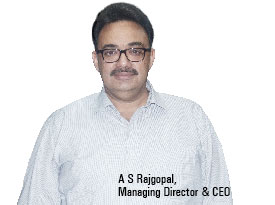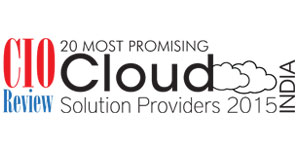 According to a report by Global Industry Analysts Inc., the Global Cloud Computing Services Market is expected to reach US$127 Billion by 2017. This growth can be attributed to the increasing realization among enterprises about inherent business value of cloud computing. Enterprises are looking at the benefits of improving data access, freeing up internal IT resources for more strategic tasks, cutting costs, and increasing flexibility, versatility, efficiency and economies of scale. However, along with the benefits, the adoption of cloud also brings with it various challenges. There are concerns for enterprises about data security and the efficiency and effectiveness of cloud services.
According to a report by Global Industry Analysts Inc., the Global Cloud Computing Services Market is expected to reach US$127 Billion by 2017. This growth can be attributed to the increasing realization among enterprises about inherent business value of cloud computing. Enterprises are looking at the benefits of improving data access, freeing up internal IT resources for more strategic tasks, cutting costs, and increasing flexibility, versatility, efficiency and economies of scale. However, along with the benefits, the adoption of cloud also brings with it various challenges. There are concerns for enterprises about data security and the efficiency and effectiveness of cloud services. 
NxtGen believes in having a strong understanding of as-is status of customers’ IT deployment, prior to embarking on an Infinite Datacenter journey
For the large enterprises, the burden of legacy systems is just one challenge that adds to the complexity of cloud computing while CIOs and cloud leaders face many other common challenges, including security, vendor lock-in, and shadow IT. However, it cannot be denied that the dynamic nature of cloud computing has yielded many good results like pushing data center workload, server, and even hardware automation to whole new levels. But to grab every opportunity that cloud brings along, IT service providers need to build the necessary skill sets and add value to their offering to bolster scalability. Data center providers looking to get into cloud computing need to focus on automation to be as agile as possible in the cloud world.
Scaling the infrastructure horizontally
NxtGen Datacenter & Cloud Technologies, headquartered in Bangalore, has addressed these issues by building a cloud architecture which is different from typical enterprise private cloud deployment, enabling it to horizontally scale the infrastructure. “Customers want automation, not managed services. The more the service providers are able to automate, the more value they would create for the customer,” says A S Rajgopal, Managing Director & CEO of the company. With hybrid IT infrastructure being a reality, NxtGen delivers cloud services either hosted within its own datacenters and/or at customer’s premises. The company works with customers to leverage their existing physical infrastructure along with NxtGen’s virtual infrastructure, leading to an ‘Infinite Datacenter’. “Enterprises can now build digital businesses without owning hardware. They now have infinite resources to run new applications and enable new business models such as flash sales and targeted promos,” adds Rajgopal. NxtGen has scaled some media websites by 28 times during national and Maharashtra elections. Its auto-scalability offering is also being used by Department of Science & Technology and for a flash sale of a popular Smartphone.
Most of the service providers in India are focused on delivering public cloud services based on standard enterprise private cloud architectures. NxtGen has pioneered in this segment with its unique cloud architecture to scale the resources horizontally and is working on building intellectual property for its cloud architecture. NxtGen’s storage is based on SSDs and offers unparalleled performance. The company is the only cloud IaaS provider to offer an on-premise cloud service that is elastic, on-demand and available on a pay-per-use model. This service is made available to customers without any penalty clauses in case customer chooses to terminate the service at any time. NxtGen offers its Cloud IaaS services from its Datacenters located in Bangalore and Mumbai. The company provides a self-service portal for customers to configure their VMs and make payments online through credit card. It also endows its prospective customers with an option of 30 day free-trial of unlimited resources.
Datacenter-as-a-service - a hybrid model
NxtGen’s Enterprise Cloud Services™ offer the optimum solution in the form of private virtual datacenters at lower than public cloud service cost. The company has designed the hybrid solution by integrating key features from public, private and physical environments and by incorporating technologies from industry leaders such as Intel EMC, Brocade, Microsoft, VMware, OpenStack, Commvault, Symantec, Fortinet etc. By avoiding IT infrastructure lock-in, NxtGen ECS empowers enterprises to grow limitlessly. Enterprises derive business value by using NxtGen’s Datacenter-as-a-service, a hybrid model which comprises of a full range datacenter and cloud services from its own facilities (HDDC™) or centrally managed modular solutions at customer’s premises (OPDC™).
Typically, businesses build their datacenters, big or small within commercial buildings or their offices. OPDC has been designed with consideration such as floor loading, height restrictions, 24x7 monitoring and to deliver cost savings. OPDC runs the cooling in a closed loop focusing on cooling the servers rather than the room. All required components such as power conditioning/ups, temperature, fire & smoke and other components are fully integrated. NxtGen has developed electronics to collate all the critical information and passed on to its DCIM, which is centrally monitored by its team 24x7. With OPDC, customers get more efficient datacenter and additionally save on people costs for running 24x7 DC operations, eventually experiencing a 40 percent decrease in their cost of operating a datacenter.
NxtGen believes in having a strong understanding of as-is status of customers’ IT deployment, prior to embarking on an Infinite Datacenter journey. “We have built a strong team, comprising people mostly from enterprise organizations who have run IT operations for many decades. The knowledge and experience of this team helps us define path for our customers, with milestones that deliver critical business value,” says Rajgopal.
Securing valuable data
Security, regulatory and compliance requirements are few of the many reasons why IT infrastructures today exist in a hybrid form. The architecture for infrastructure deployment has to take into these considerations and ensure customer’s comfort. While doing so, enterprises find it difficult to make the right investments in terms of technology and skill sets. At NxtGen, these investments are leveraged over multiple customers, making it viable to deliver high level of security services to the customers. “For each of our customers, we ensure before going to production that we test for vulnerabilities and protect them while they are fixing those vulnerabilities,” shares Rajgopal.
Every enterprise has critical data running through the enterprise applications. To protect this valuable data, NxtGen provides three levels of solution at the technology level. Every single instance is replicated, and further the company proposes replication of databases. In addition, for a zero data-loss solution with zero RPO, it provides block level replication. NxtGen has several financial institutions running on its infrastructure. Most of the applications and data have regulatory restrictions and the company deploys the infrastructure for those at their premises. The applications that are not governed by compliance and regulatory norms are moved by NxtGen into the public infrastructure. The company also has strong enterprise file sync and share offering called InfiniteVault which acts as a secure vault to store all the critical enterprise documents. It completes the need for securing the data from end-points, ensuring comprehensive offering to meet all enterprise needs at the infrastructure layer.
What has made NxtGen successful is its right mix of people, financial strength, process and technology support. Having investors such as Intel Capital, IFC (World Bank group) and Axon, NxtGen provides its customers with an organization level comfort. “A customer experience is the final testimony of what we can deliver. We have more than 40 mid sized enterprises who do not own a single hardware server. We measure our achievement by the number of companies who have been able to adopt our Infinite Datacenter for the long term,” signs off Rajgopal.
NxtGen’s Enterprise Cloud Services™ offer the optimum solution in the form of private virtual datacenters at lower than public cloud service cost. The company has designed the hybrid solution by integrating key features from public, private and physical environments and by incorporating technologies from industry leaders such as Intel EMC, Brocade, Microsoft, VMware, OpenStack, Commvault, Symantec, Fortinet etc. By avoiding IT infrastructure lock-in, NxtGen ECS empowers enterprises to grow limitlessly. Enterprises derive business value by using NxtGen’s Datacenter-as-a-service, a hybrid model which comprises of a full range datacenter and cloud services from its own facilities (HDDC™) or centrally managed modular solutions at customer’s premises (OPDC™).
Typically, businesses build their datacenters, big or small within commercial buildings or their offices. OPDC has been designed with consideration such as floor loading, height restrictions, 24x7 monitoring and to deliver cost savings. OPDC runs the cooling in a closed loop focusing on cooling the servers rather than the room. All required components such as power conditioning/ups, temperature, fire & smoke and other components are fully integrated. NxtGen has developed electronics to collate all the critical information and passed on to its DCIM, which is centrally monitored by its team 24x7. With OPDC, customers get more efficient datacenter and additionally save on people costs for running 24x7 DC operations, eventually experiencing a 40 percent decrease in their cost of operating a datacenter.
NxtGen believes in having a strong understanding of as-is status of customers’ IT deployment, prior to embarking on an Infinite Datacenter journey. “We have built a strong team, comprising people mostly from enterprise organizations who have run IT operations for many decades. The knowledge and experience of this team helps us define path for our customers, with milestones that deliver critical business value,” says Rajgopal.
Securing valuable data
Security, regulatory and compliance requirements are few of the many reasons why IT infrastructures today exist in a hybrid form. The architecture for infrastructure deployment has to take into these considerations and ensure customer’s comfort. While doing so, enterprises find it difficult to make the right investments in terms of technology and skill sets. At NxtGen, these investments are leveraged over multiple customers, making it viable to deliver high level of security services to the customers. “For each of our customers, we ensure before going to production that we test for vulnerabilities and protect them while they are fixing those vulnerabilities,” shares Rajgopal.
Every enterprise has critical data running through the enterprise applications. To protect this valuable data, NxtGen provides three levels of solution at the technology level. Every single instance is replicated, and further the company proposes replication of databases. In addition, for a zero data-loss solution with zero RPO, it provides block level replication. NxtGen has several financial institutions running on its infrastructure. Most of the applications and data have regulatory restrictions and the company deploys the infrastructure for those at their premises. The applications that are not governed by compliance and regulatory norms are moved by NxtGen into the public infrastructure. The company also has strong enterprise file sync and share offering called InfiniteVault which acts as a secure vault to store all the critical enterprise documents. It completes the need for securing the data from end-points, ensuring comprehensive offering to meet all enterprise needs at the infrastructure layer.
What has made NxtGen successful is its right mix of people, financial strength, process and technology support. Having investors such as Intel Capital, IFC (World Bank group) and Axon, NxtGen provides its customers with an organization level comfort. “A customer experience is the final testimony of what we can deliver. We have more than 40 mid sized enterprises who do not own a single hardware server. We measure our achievement by the number of companies who have been able to adopt our Infinite Datacenter for the long term,” signs off Rajgopal.






